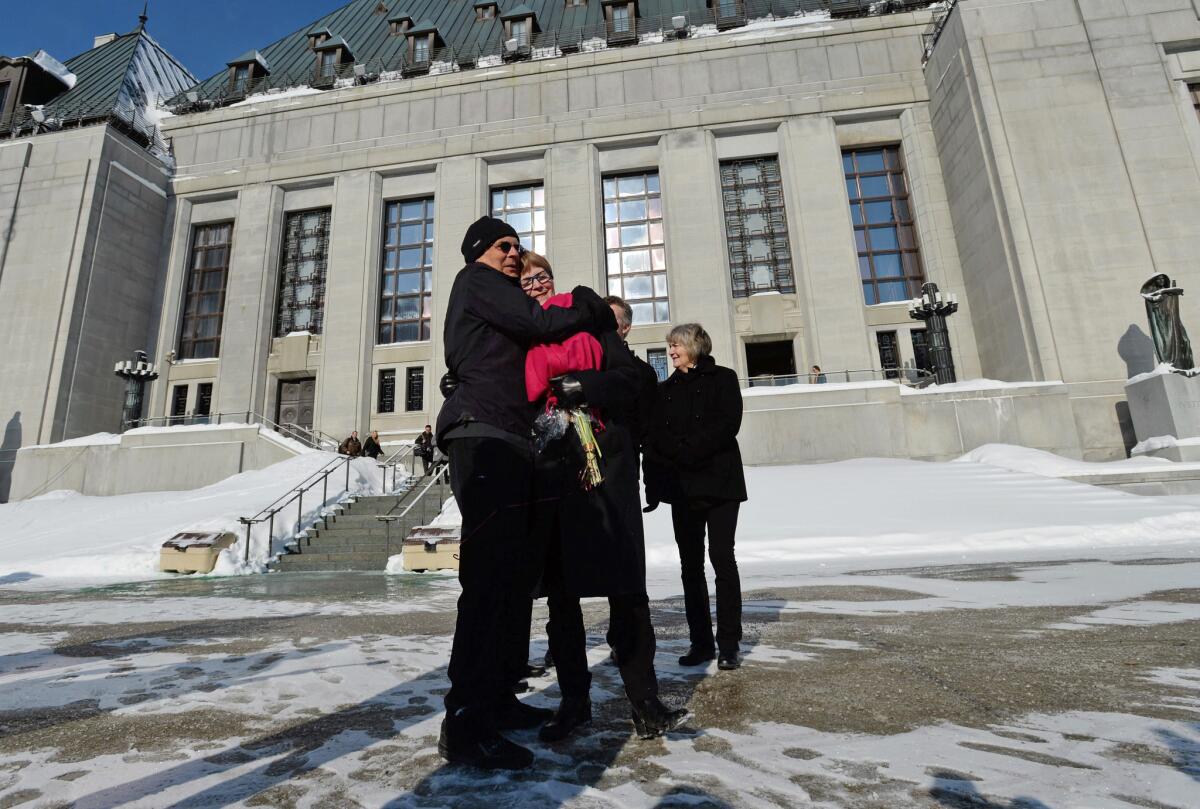Canada’s high court strikes down ban on assisted suicide

- Share via
Canada’s absolute ban on assisted suicide is out of step with the times and deprives those with incurable illnesses their right to decide matters “critical to their dignity and autonomy,” the Supreme Court of Canada ruled Friday.
The 9-0 decision strikes down a 1993 ruling that denied a terminally ill woman the right to end her life when the suffering became intolerable -- a position the justices said Friday was no longer justified in a free society.
The high court said evidence presented by scientists, medical practitioners and others familiar with end-of-life decision-making in Canada and abroad showed it would be possible to craft a law permitting doctor-assisted suicide “with properly designed and administered safeguards” to protect the most vulnerable.
Doctor-assisted death should be an available option for “a competent adult person who (1) clearly consents to the termination of life and (2) has a grievous and irremediable medical condition (including an illness, disease or disability) that causes enduring suffering that is intolerable,” the court ruling stated.
Canadian lawmakers have a year to draft a new law governing the conditions under which assisted suicide should be permitted and in line with Friday’s ruling. If no new law is enacted within the 12 months, the court said, doctor-assisted deaths for the incurably ill and suffering will become legal options.
Justice Minister Peter MacKay told journalists at the Ottawa courthouse that the government would have to thoroughly review the decision before deciding how to respond, taking note of what he said was “a broad range of thoughts and views on this by Canadians.”
The lower court challenge of the assisted suicide ban was brought by two British Columbia women, Kay Carter and Gloria Taylor, suffering from incurable conditions. Both died before the case reached the Supreme Court, 89-year-old Kathleen “Kay” Carter during a 2010 visit to Switzerland, where assisted suicide is legal, and 64-year-old Taylor of an infection in 2012.
The constitutional challenge on their behalf was brought by the British Columbia Civil Liberties Assn.
Carter’s daughter, Lee, who accompanied her mother on the trip to Switzerland, told the Toronto Star that the high court ruling was “a huge victory for Canadians and a legacy for Kay.”
Grace Pastine of the civil liberties group said death-with-dignity advocates were “overjoyed” with the ruling. “What this decision means is that Canadians who are suffering unbearably at the end of life have a choice now,” she said.
But Campaign Life Coalition leader Jim Hughes issued a statement urging Parliament to counter the impact of the ruling with a new law “that protects vulnerable Canadians from assisted-suicide.” He expressed concern that the terminally ill are at great risk of being persuaded to end their lives when assisted suicide is a legal option.
Canada now appears destined to join Switzerland, the Netherlands, Belgium, Luxembourg, Germany, Albania, Colombia and Japan as nations that allow doctor-assisted suicide in at least some circumstances. The U.S. states of Washington, Oregon, Vermont, New Mexico and Montana also have right-to-die laws.
Follow @cjwilliamslat for the latest international news 24/7
More to Read
Sign up for Essential California
The most important California stories and recommendations in your inbox every morning.
You may occasionally receive promotional content from the Los Angeles Times.














